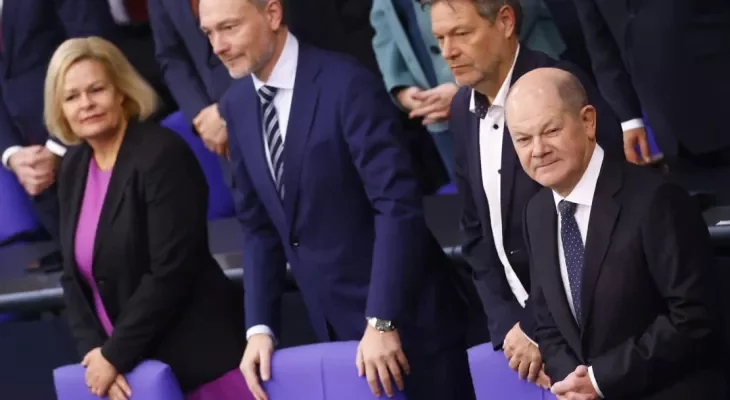
Germany’s parliament has given the green light to a revised 2024 budget, navigating through legal challenges that compelled Chancellor Olaf Scholz to adjust spending proposals. The approved budget, totaling 477 billion euros ($519 billion), represents a delicate balance following months of negotiations and includes 39 billion euros in new borrowing.
This revised budget aims to bring Germany back in line with its constitutional “debt brake,” a fiscal policy that limits government borrowing to 0.35 percent of annual GDP, except in extraordinary circumstances. The debt brake had been temporarily suspended since 2020 due to the pandemic and subsequent economic repercussions from events like Russia’s conflict with Ukraine.
With 388 votes in favor and 279 against, the Bundestag lower house passed the budget, signaling a challenging yet necessary compromise for the coalition government.
Adjustments include higher ticket taxes on passenger flights, modifications to social benefits, and a reduction in agricultural subsidies, which has stirred discontent among farmers.
The need for budget revisions arose after a constitutional court ruling in November invalidated the government’s initial spending plans, highlighting breaches of the debt rule.
The court’s decision left a significant shortfall of 17 billion euros in the 2024 budget, prompting Scholz’s coalition to scramble for solutions.
Contentious measures such as the proposed elimination of a diesel tax break for agricultural vehicles sparked nationwide protests by farmers. Although the government withdrew plans to abolish a vehicle tax discount for agricultural machinery, debate over the phaseout of agricultural diesel tax relief continues in the Bundesrat upper house, with a vote scheduled for March 22.
The budget crisis has reignited discussions about Germany’s “debt brake,” particularly as the economy grapples with challenges and significant investments are required for the green transition and infrastructure modernization. These debates have exacerbated tensions within Scholz’s coalition, which faces declining public approval.
Diverging viewpoints within the coalition, with the liberal FDP advocating for strict adherence to the debt cap while the Social Democrats and Greens show openness to flexibility, underscore the complexities of governance.
In his State of the Union address, President Donald Trump will aim to bolster support…
A militant attack on a government school in South Waziristan left the district reeling. Unidentified…
At this year's Golden Globes, renowned actress Renate Reinsve, hailing from Norway, managed to keep…
A devastating crash in central Iran's Dorcheh town last Tuesday morning claimed the lives of…
ISLAMABAD: Pakistan is emerging as a key destination for international business ventures, particularly in sectors…
Pakistan's Senate passed a unanimous resolution in response to Israel’s recent statements, reiterating strong opposition…
This website uses cookies.